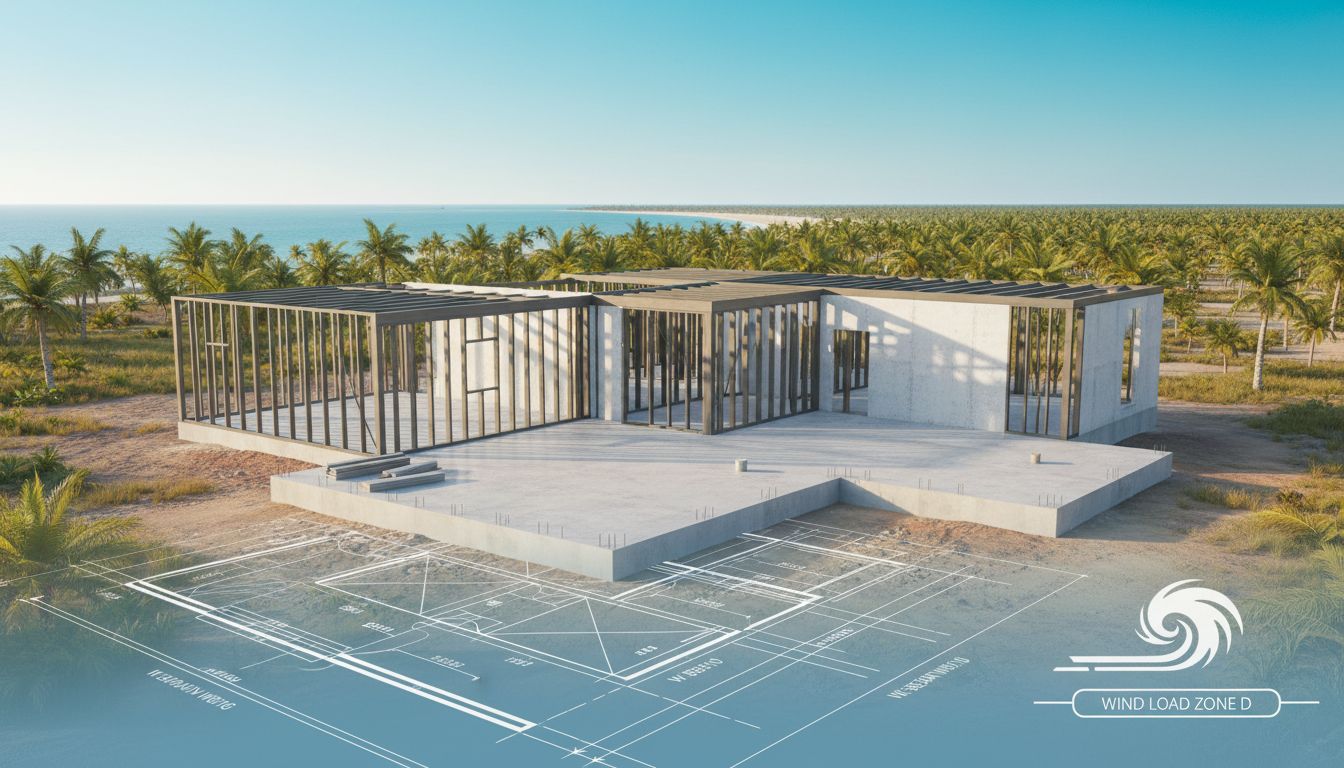Navigating Home Remodeling Permits in Cape Coral, FL
Understanding Why Permits Matter in Cape Coral
Permits play a crucial role in home remodeling projects, ensuring that all work meets safety and legal standards. In Cape Coral, permits are designed to protect homeowners from potential hazards while maintaining the integrity of the community. By requiring inspections and approvals, the city ensures that any structural changes, electrical updates, or plumbing installations are completed by qualified professionals. This not only safeguards your family but also helps preserve property values across the neighborhood.
Beyond safety, permits are essential for addressing Cape Coral's unique environmental challenges. The area is prone to hurricanes and flooding , so building codes often include requirements for storm-resistant materials and proper elevation. Adhering to these regulations not only protects your home during severe weather but also aligns with community-wide efforts to reduce flood risks. Ultimately, securing permits demonstrates responsibility and commitment to maintaining Cape Coral’s high standards. Understanding this sets the stage for exploring which projects specifically require these important documents.
What Types of Home Remodeling Projects Require Permits?
Several types of home remodeling projects in Cape Coral require permits to ensure compliance with local regulations. Major structural changes, such as adding an extension or removing load-bearing walls, always need approval. Similarly, significant updates like replacing a roof , installing new electrical systems, updating plumbing, constructing docks, or adding pools must also go through the permitting process. These projects can impact the safety and functionality of your home, making official oversight critical.
On the other hand, smaller cosmetic projects may not require permits. For example, painting your walls, replacing cabinet doors, or installing new flooring typically doesn’t involve structural or safety concerns. However, even seemingly minor upgrades—like adding a backsplash or changing light fixtures—might trigger permit requirements if they involve electrical or plumbing work. Knowing what does and doesn’t need a permit helps you plan efficiently while staying compliant. Now let’s examine how Cape Coral’s geography influences its specific permitting rules.
Unique Permitting Considerations for Cape Coral
Cape Coral’s location presents unique challenges that influence its permitting requirements. With its extensive canal system and vulnerability to hurricanes and flooding, the city has implemented strict guidelines to mitigate risks. For instance, properties near water often need special attention to seawalls, drainage systems, and elevation levels. These measures help prevent damage during storms and reduce the likelihood of flooding, protecting both individual homes and the broader community.
Environmental reviews are another key consideration, especially for waterfront properties. Any project that could affect local ecosystems—such as dock construction or shoreline modifications—must undergo thorough assessments to ensure minimal impact. These additional steps reflect Cape Coral’s dedication to balancing development with environmental preservation. As we move forward, understanding these nuances will prepare you for navigating the actual application process, which involves several distinct stages.
Step-by-Step: The Home Remodeling Permit Application Process
The first step in obtaining a home remodeling permit is preparing your application. This includes gathering detailed plans, specifications, and cost estimates for your project. You’ll also need documentation proving compliance with relevant codes, such as structural engineering reports or energy efficiency calculations. Licensed contractors or design professionals often assist with this phase to ensure accuracy and completeness. Once everything is ready, applications can be submitted online through platforms like EnerGov or eConnect, streamlining the process significantly.
After submission, your application enters the review stage, where city officials evaluate it against zoning laws, building codes, and environmental standards. During this time, you can track progress using online tools provided by Cape Coral. If issues arise, reviewers may request revisions or clarifications before granting approval. It’s important to address feedback promptly to avoid delays. Finally, once approved, you’ll receive instructions on posting your permit and scheduling initial inspections —a vital part of starting construction legally.
Throughout this process, working closely with licensed professionals is highly recommended. Contractors bring expertise in navigating technical requirements and avoiding common pitfalls. They also handle communication with inspectors, saving you time and stress. Remember, submitting complete and accurate documents at every stage is crucial for keeping the process moving smoothly. With your permit secured, attention shifts to understanding the agencies and codes governing these approvals.
Key Agencies and Codes Affecting Cape Coral Permits
Several key agencies oversee the permitting process in Cape Coral, each playing a specific role in ensuring compliance. The City Building Department is the primary authority responsible for reviewing applications and conducting inspections. Additionally, the Health Department weighs in on projects involving septic systems or wastewater management, while environmental authorities focus on minimizing ecological impacts. Their collective input ensures that all remodeling projects align with Cape Coral’s goals for safety, sustainability, and resilience.
These agencies operate under frameworks established by the Florida Building Code and Lee County Land Development Code. These codes dictate everything from foundation requirements to hurricane-proofing standards, shaping how projects are planned and executed. Familiarizing yourself with these regulations—or consulting experts who know them well—can help you anticipate potential hurdles and streamline your application. Next, we’ll discuss the financial aspect of permits, including fees and inspection protocols.
Permit Fees and Inspection Requirements
Permit fees vary depending on the scope and complexity of your project. Generally, they are calculated based on factors like square footage, material costs, and labor estimates. Payments are typically due upon application submission and can be made online through the same portals used for filing. While fees might seem like an added expense, they support essential services, including plan reviews and inspections, which ultimately protect your investment.
Inspections occur at various stages throughout construction to verify compliance with approved plans and codes. Scheduling these checks is straightforward, usually done via phone or online systems. Passing final inspections is critical because it leads to the issuance of certificates of occupancy or compliance, officially closing out your project. Understanding this schedule ensures you stay on track and avoid unnecessary delays. Before diving into common mistakes, keep in mind that preparation is key to avoiding costly errors.
Common Pitfalls: Mistakes to Avoid in the Permitting Process
One of the most frequent issues in the permitting process is incomplete or missing documentation, which can lead to delays and rejections. Un licensed contractors are another common problem, as their work may not meet code standards. Additionally, submitting inaccurate site plans or failing to address specific geographic considerations—like flood zones—can result in complications. Perhaps the biggest mistake is starting work without proper approval, which can lead to fines and mandatory corrections. Avoiding these pitfalls requires careful planning and adherence to guidelines.
Permit Timelines: How Long Does Approval Take?
Approval timelines for home remodeling permits in Cape Coral typically range from a few weeks to several months, depending on the complexity of the project. Simple applications may be processed quickly, while those requiring environmental reviews or multiple agency approvals take longer. Factors like high demand, incomplete submissions, or unforeseen complications can extend processing times. To minimize delays, submit thorough applications early and respond promptly to any requests for additional information.
Special Topics: Hurricane Preparedness and Remodeling
In Cape Coral, remodeling permits often intersect with mandatory hurricane-proofing measures. Projects may require features like impact-resistant windows, elevated foundations, or reinforced roofing materials to withstand severe weather. These requirements not only enhance your home’s durability but also contribute to broader community resilience efforts. Incorporating these elements into your plans ensures compliance while safeguarding your property against future storms.
Dealing with Rejected or Delayed Permit Applications
If your permit application is rejected or delayed, don’t panic—there are steps you can take to resolve the issue. Start by carefully reviewing feedback from reviewers to identify areas needing adjustment. Resubmit revised documents promptly, ensuring all necessary corrections have been addressed. If challenges persist, consider reaching out to the Cape Coral Building Department for clarification or assistance. Their guidance can often help overcome obstacles and move your project forward.
Homeowner vs. Contractor: Who Should Apply for the Permit?
Deciding whether a homeowner or contractor should apply for a permit depends on the project’s complexity. For straightforward tasks, homeowners may choose to self-apply, saving money and gaining hands-on experience. However, hiring a licensed contractor is advisable for more intricate work, as they understand regulatory nuances and can navigate the process efficiently. Each approach has pros and cons, so weigh your options carefully based on your skills and project needs.
After Approval: Inspections, Certificates, and Project Close-Out
Once your permit is approved, regular inspections become a central focus. These checks occur at key milestones, ensuring ongoing compliance with approved plans. Failing an inspection means addressing deficiencies before proceeding, so it’s important to prioritize quality workmanship. Successfully passing all inspections culminates in the issuance of a certificate of occupancy or compliance, signaling the official completion of your project.
Obtaining this certificate is a significant milestone, allowing you to use your newly remodeled space with confidence. It also serves as proof of compliance, which can be valuable when selling your home. Properly closing out your permit ensures no lingering liabilities and reinforces the importance of adhering to Cape Coral’s regulations. With this understanding, let’s address some frequently asked questions about the permitting process.
Frequently Asked Questions About Home Remodeling Permits in Cape Coral
- Do I need a permit to remodel my kitchen
or bathroom in Cape Coral?
Whether you need a permit for kitchen or bathroom remodels depends on the extent of the work. Cosmetic updates like painting or replacing fixtures usually don’t require permits. However, moving walls, altering plumbing lines, or rewiring electrical systems trigger permit requirements. Always check with the Cape Coral Building Department to confirm whether your specific project qualifies.
- How can I check the status of my permit application?
You can track the status of your permit application online using tools like EnerGov or eConnect. These platforms provide real-time updates on where your application stands in the review process. If you encounter issues or need further clarification, contacting the Building Department directly is a reliable option.
- What happens if I do work without a permit?
Working without a permit can lead to serious consequences, including fines, stop-work orders, and potential legal action. Additionally, unpermitted work may complicate property sales, as buyers often require proof of compliance. It’s always best to secure permits upfront to avoid these risks.
- Can I start construction while waiting for my permit?
No, construction cannot begin until after your permit is officially approved and posted at the site. Starting prematurely violates city regulations and can result in penalties. Exceptions exist for emergency repairs, but these are rare and must be pre-approved.
- How long does my permit stay valid once issued?
Permits typically remain valid for six months to a year, depending on the project type. If delays occur, extensions may be available, but you’ll need to request them before expiration. Keeping tabs on your permit’s validity ensures continuous compliance throughout your project.
Conclusion
Navigating home remodeling permits in Cape Coral is a vital step in protecting your investment and ensuring your project complies with local regulations. From safety and hurricane preparedness to preserving property values, permits serve as a cornerstone of responsible development in this unique region. By understanding the process—from required documents to inspections—you position yourself for success while contributing to the community’s overall resilience.
As you embark on your remodeling journey, take the time to research your project’s specific needs and consult official city resources for guidance. Whether you’re tackling a small update or a major renovation, partnering with qualified professionals and submitting complete applications early will save you time and stress. Embrace the opportunity to build or remodel confidently, knowing you’re creating a safer, more valuable home in beautiful Cape Coral. For personalized advice, reach out to the Cape Coral Building Department—they’re here to help!






